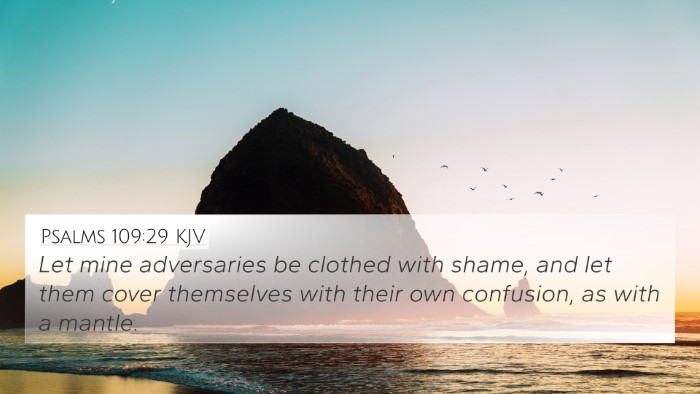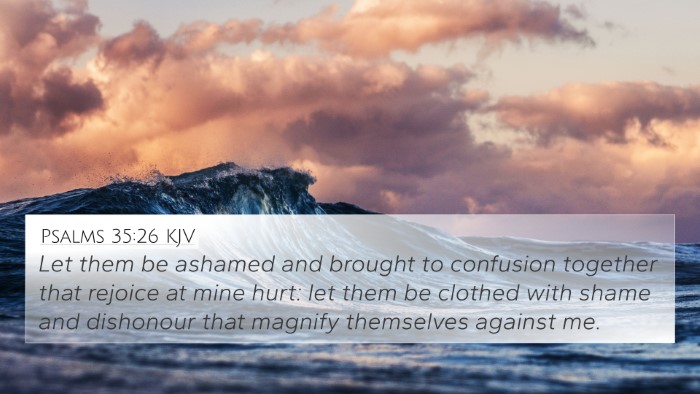Psalms 109:19 - Summary and Interpretation
Psalms 109:19 states: "Let this be the reward of mine adversaries from the Lord, and of them that speak evil against my soul." This verse encapsulates a plea for divine justice against adversaries and those who speak ill of the speaker.
Meaning and Context
Psalms 109 forms a part of the imprecatory psalms, wherein the psalmist calls upon God to impart judgment upon his enemies. The essence of this verse lies in the desire for the adversaries' actions to be met with divine retribution, highlighting the struggle between good and evil.
Insights from Commentaries
- Matthew Henry: Henry elaborates on the notion that the psalmist's heart is heavy with the enemies' slander and that he appeals to God for vindication. This verse reveals the internal tumult faced by a faithful individual threatened by malicious words and deeds.
- Albert Barnes: Barnes underscores the broader theme of divine justice in this verse. He posits that the psalmist feels deeply wronged and anticipates that God will act against those who conspire against him. The prayer expressed here is potent, focusing on a mirror of the adversaries’ actions and their consequences.
- Adam Clarke: Clarke emphasizes the contrast between the psalmist’s integrity and the enemies' malevolence. He draws attention to the significant emotional weight of the statement and how it indicates a longing for resolution and righteousness.
Thematic Connections
This verse resonates with themes identifiable across various biblical texts. The desire for vindication against adversaries appears throughout scripture, establishing an identifiable motif of divine justice.
Cross-Referenced Verses
Here are some applicable cross-reference verses that parallel with Psalms 109:19:
- Psalm 7:9: "Oh, let the wickedness of the wicked come to an end; but establish the just…" - A plea for justice against wrongdoers.
- Psalm 35:4: "Let those be put to shame and brought to dishonor who seek after my life!" - Similar expression of seeking divine intervention against enemies.
- Proverbs 17:13: "Whoever rewards evil for good, evil will not depart from his house." - A reflection on the consequences of malevolent actions.
- Matthew 5:44: "But I say to you, Love your enemies and pray for those who persecute you." - Jesus' teaching on how to react to adversaries contrasts with the Psalmist's plea for justice.
- Romans 12:19: "Beloved, never avenge yourselves, but leave it to the wrath of God…" - This New Testament verse encouraged believers to trust God for justice.
- Revelation 6:10: "O Sovereign Lord, holy and true, how long before you will judge and avenge our blood on those who dwell on the earth?" - A cry for vindication that mirrors the sentiments expressed in Psalms 109:19.
- Galatians 6:7: "Do not be deceived: God is not mocked, for whatever one sows, that will he also reap." - Affirms the principle of divine justice that is echoed in Psalms 109.
Understanding Imprecatory Psalms
The imprecatory psalms, such as Psalm 109, are notable for their requests for divine punishment on the psalmist's enemies. They serve to express deep feelings of hurt and the thirst for justice in the face of evil.
They reveal a profound aspect of human emotions, presenting the raw feeling of betrayal and injustice that many believers can resonate with. Understanding these psalms involves recognizing the context of personal pain and the cry for God’s intervention.
Application Today
In contemporary settings, Psalms 109:19 reminds modern believers of their need to rely on God for justice against injustices and slanders encountered. There is a call to trust in God's righteous judgment rather than retaliating personally.
Additionally, it encourages reflection on how believers should respond to those who wrong them and what it means to seek reconciliation while also acknowledging the reality of harmful adversaries.
Tools for Bible Cross-Referencing
Utilizing tools for cross-referencing such as a Bible concordance or a Bible cross-reference guide significantly enhances the study of scripture, allowing one to explore connections like that of Psalm 109:19 to its numerous related verses effectively.
Some beneficial practices include:
- Using concordances to locate verses related by themes.
- Engaging in cross-reference Bible study methods for deeper comprehension.
- Exploring inter-Biblical dialogue through comparative studies of different texts.
Conclusion
Psalms 109:19 serves as an earnest expression of seeking justice and understanding the human condition regarding relationships marred by hostility and betrayal. By examining cross-references and utilizing proper tools for understanding scriptures, believers gain clarity and insight into the broader narrative of the Bible.






